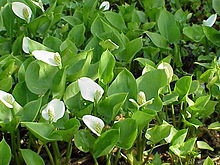Calla
| Calla | |
|---|---|

| |

| |
| Flora von Deutschland, Österreich und der Schweiz 1885 | |
| Scientific classification | |
| Kingdom: | Plantae |
| Clade: | Tracheophytes |
| Clade: | Angiosperms |
| Clade: | Monocots |
| Order: | Alismatales |
| Family: | Araceae |
| Subfamily: | Aroideae |
| Tribe: | Calleae Bartl. |
| Genus: | Calla L. |
| Species: | C. palustris
|
| Binomial name | |
| Calla palustris L.
| |
| Synonyms[3] | |
|
Genus:
Species:
| |
Calla is a genus of flowering plant in the family Araceae, containing the single species Calla palustris (bog arum, marsh calla, wild calla, squaw claw, and water-arum[4]).
Description
[edit]It is a rhizomatous herbaceous perennial plant growing in bogs and ponds. The leaves are rounded to heart-shaped, 6–12 cm (2+1⁄4–4+3⁄4 in) long on a 10–20 cm (4–8 in) petiole, and 4–12 cm (1+1⁄2–4+3⁄4 in) broad. The greenish-yellow inflorescence is produced on a spadix about 4–6 cm (1+1⁄2–2+1⁄4 in) long, enclosed in a white spathe. The fruit is a cluster of red berries, each berry containing several seeds.[5][6]
The plant is very poisonous when fresh due to its high oxalic acid content, but the rhizome (like that of Caladium, Colocasia, and Arum) is edible after drying, grinding, leaching and boiling.[7][8][9]
Taxonomy
[edit]The genus formerly also included a number of other species, which have now been transferred to the separate genus Zantedeschia. These plants from tropical Africa, however, are still often termed "calla lilies" but should not be confused with C. palustris.[10]
Distribution
[edit]It is native to cool temperate regions of the Northern Hemisphere, in central, eastern and northern Europe (France and Norway eastward), northern Asia and northern North America (Alaska, Canada, and northeastern contiguous United States).[3][11][12][13]
References
[edit]- ^ "Calla palustris". NatureServe. Retrieved 22 March 2023.
- ^ Lansdown, R.V. (2014). "Calla palustris". IUCN Red List of Threatened Species. 2014: e.T167822A42334121. Retrieved 22 March 2023.
- ^ a b "Calla". World Checklist of Selected Plant Families (WCSP). Royal Botanic Gardens, Kew.
- ^ Dickinson, T.; Metsger, D.; Bull, J.; & Dickinson, R. (2004) ROM Field Guide to Wildflowers of Ontario. Toronto:Royal Ontario Museum, p. 62.
- ^ Thompson, Sue A. (2000). "Calla palustris". In Flora of North America Editorial Committee (ed.). Flora of North America North of Mexico (FNA). Vol. 22. New York and Oxford: Oxford University Press – via eFloras.org, Missouri Botanical Garden, St. Louis, MO & Harvard University Herbaria, Cambridge, MA.
- ^ Li, Heng; Boyce, Peter C.; Bogner, Josef. "Calla palustris". Flora of China. Vol. 23 – via eFloras.org, Missouri Botanical Garden, St. Louis, MO & Harvard University Herbaria, Cambridge, MA.
- ^ A Dictionary of Flowering Plants and Ferns - JC Willis
- ^ "Calla palustris". Plants for a Future.
- ^ "Wild calla-Calla palustris-Poisonous plants". Pharmacognosy.
- ^ "Calla Lily Care: Grow Stunning Blooms All Season Long". www.plantgardener.com. 2024-04-03. Retrieved 2024-06-03.
- ^ Govaerts, R. & Frodin, D.G. (2002). World Checklist and Bibliography of Araceae (and Acoraceae): 1–560. The Board of Trustees of the Royal Botanic Gardens, Kew.
- ^ Herkert, J.R. & Ebinger, J.E. (eds.) (2002). Endangered and Threatened Species of Illinois: status and distribution 1: 1–161. Endangered Species Protection Board, Springfield, Illinois.
- ^ Sabirova, N.D. & Sabirov, R.N. (2011). New and rare vascular plant species of Northern Sakhalin. Byulleten' Glavnogo Botaniceskogo Sada 197: 80–86.
- Blanchan, Neltje (2002). Wild Flowers: An Aid to Knowledge of our Wild Flowers and their Insect Visitors. Project Gutenberg Literary Archive Foundation.
External links
[edit] Media related to Calla at Wikimedia Commons
Media related to Calla at Wikimedia Commons Data related to Calla palustris at Wikispecies
Data related to Calla palustris at Wikispecies- Go Botany, New England Wildflower Society
- Missouri Gardening, plant finder, Gardening Help
- North Carolina State University Cooperative Extension
- Connecticut Botanical Society, Wild Calla (Water Arum) Archived 2013-05-31 at the Wayback Machine
- Chayka, Katy; Dziuk, Peter (2016). "Calla palustris (Wild Calla)". Minnesota Wildflowers.
- University Botanic Gardens at Ljubljana


